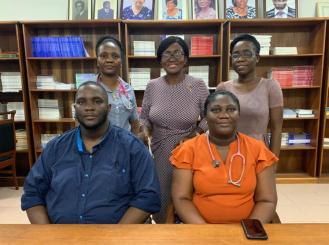Jul 15, 2021
Lorna Awo Renner, MBChB, MPH, FRCPCH, FGCPS, encourages women in oncology to look for opportunities to effectively tackle challenges in their field and to never lose hope that they can make it. As a lecturer at the University of Ghana Medical School in Accra, Ghana, and head of the pediatric oncology unit at Korle Bu Teaching Hospital, she continues to find ways to be a mentor to those around her.
Dr. Renner is currently a mentor to several young women in the pediatric oncology fellowship program that she began under the Ghana College of Physicians and Surgeons. Through her work with mentees, Dr. Renner hopes to help fight disparities for women in oncology, particularly in Ghana, where there is a shortage of pediatric oncologists.
Conquer Cancer, the ASCO Foundation, is pleased to honor Dr. Renner as the 2021 International Women Who Conquer Cancer (WWCC) Mentorship Award recipient.
Did women in leadership roles inspire your path?
LR: I have been inspired by several women in leadership. For example, as a young girl, the headmistress of a girls’ secondary school I attended inspired me to not restrict myself to excellence in only one role. Even though she taught physics, she performed exceptionally well in other roles. Later, another female leader inspired me to take up pediatric oncology as a career and research as an academician in a resource-limited setting. Her ability to succeed, despite being faced with several challenges, was a source of encouragement and helped me develop perseverance to overcome any obstacles.
What is the greatest hurdle facing women in oncology?
LR: I would say work-life balance. Both compete for one’s attention and time. It can be quite challenging as one has to give of one’s best in undertaking the responsibilities one has as a woman in both areas. This could lead to stress, possible burnout, and sub-optimal performance.
What can be done to create more parity among men and women in medicine?
LR: In some jurisdictions, there are disparities in compensation for similar work done. Addressing this issue would be important. In some situations, providing dependable childcare close to work would help improve performance and promote more parity.
Why is it important to fund the research of female scientists?
LR: Scientific research was generally perceived in the past to be a predominantly male territory. There may still not be as much respect or authority given to female scientists compared to male scientists. Women may have to work harder to prove themselves, and they may not have a sense of belonging to what in some institutions may seem like a men’s club. Supporting the research of female scientists would translate to increased output and more visibility for the contributions made by women to science, as well as give them more respect and acceptability as equal to their male colleagues. There would be more female scientific mentors, and this would encourage more girls into STEM and to take up research in the sciences.
How do programs like WWCC elevate women in oncology?
LR: Such programs are a source of motivation for women in oncology. These programs encourage women to persevere—surmounting any hurdles—to achieve excellence in this field. It is also important as it could have a positive impact on those starting out in oncology by seeing that women, who started out just like they did, have really made it in this field. Such programs could be a big boost for advocacy towards parity for women.
What’s your advice to women entering oncology today?
LR: Set goals for yourself. Believe that you can make it. Do not let setbacks deter you, but use them as opportunities to think through more effective ways of tackling a challenge. Have a mentor (or mentors). Oncology is a rapidly evolving subspecialty, so make the most of any chance to keep abreast with knowledge and scientific developments. There are lots of opportunities for research which could directly impact practice and lead to a fulfilling career wherever you are. As you progress, do reach out to mentor younger colleagues. You should try to find an acceptable balance between work and your other life commitments.
The Women Who Conquer Cancer series profiles some of the remarkable nominees for Conquer Cancer’s Women Who Conquer Cancer Mentorship Awards, which recognize role models and mentors to men and women training to be cancer clinicians, educators, or researchers.

